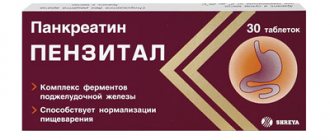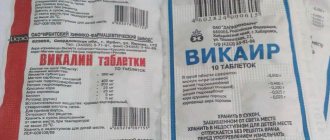What are Pancreatin tablets for?
The instructions describe the conditions and diseases for which you can take the drug:
- exocrine insufficiency of the intestine, liver, stomach, gall bladder;
- late pancreatitis that appeared after transplantation;
- problems with the gastrointestinal tract caused by prolonged immobilization of the patient;
- chronic diseases of the liver and biliary tract;
- feeling of fullness in the stomach;
- excessive accumulation of gases in the stomach;
- stabilization of the stomach in a healthy person, if it has been disrupted as a result of eating unhealthy and too fatty foods, overeating, a passive lifestyle or pregnancy;
- before performing an ultrasound of the digestive system.
Reviews
Olga Viktorovna, gastroenterologist: “I most often recommend that patients take two Pancreatin tablets with meals. It works out well for the price, and the effect is noticeable. But it is important to understand that the course of treatment depends on the severity of the disease and the general condition of the patient.”
Maxim Gennadievich, gastroenterologist: “If the disease is not serious, or we are talking about poor nutrition, then patients are given a choice. In this case, I don’t see any difference in the medications. But if we are talking about a serious gastrointestinal disease, then I conduct a full examination of the client, study the tests and choose a drug and dosage regimen. In some cases, it is necessary to very clearly understand and calculate enzyme activity. Only Mezim will help here.”
Alexey, patient: “After every hearty and stomach-heavy feast, I take a Mezim tablet. In my opinion, it’s a good remedy for eliminating heaviness or preventing fermentation after junk food. I can’t say anything about the medicinal properties.”
Margarita, patient: “When I have heaviness in my stomach, I take both Mezim and Pancreatin (depending on what I can find). But if chronic gastritis makes itself felt, then only Pancreatin. I follow my doctor’s recommendations.”
How to take Pancreatin correctly
The medicine in any form is used orally. It should be drunk with meals. Do not chew or dissolve. It is best to drink plenty of water or tea.
It is better to divide the permissible dose per day into several doses corresponding to the number of meals.
The doctor can determine the appropriate dose of the medicine after examining the patient. His condition and age category are taken into account.
In the absence of any indications, the drug should be taken 1-2 tablets per day. For the problems and diseases described above, the medicine is prescribed 2-4 tablets per day. According to the doctor's recommendations, the dosage may be increased. This is possible if necessary to reduce the symptoms of a disease.
A child aged 6-8 years can be given 1 tablet per day, children from 8 to 10 years old can be prescribed up to 2 tablets per day, children over 10 years old can be given 2 tablets per day.
Dosage
It should be noted that the dosage is determined based on the individual characteristics of the body. An approximate reception scheme can be described as follows:
- If the drug is taken to help food digest in case of excessive consumption, then you should take one tablet before the meal
- If there are obvious problems with digestion, which are manifested by pain, bad stool with undigested pieces of food, then you need to take 1 tablet before each meal
- If digestive problems are detected in a child, then in this case the dosage is prescribed only by a doctor, but usually this is one third of the tablet before meals
- In some cases, depending on how severely the organ functions are impaired, the number of tablets can be increased to 2 at a time.
The medicine should be taken strictly before meals. In addition, the tablet does not need to be chewed; it must be washed down with water. Of course, if you and your friend decide to figure it out, then nothing bad will happen. But the taste and smell of the medicine is very specific and quite unpleasant.
Contraindications and adverse reactions
Like other medications, Pancreatin has several contraindications for use. These include:
- people with acute and aggravated chronic pancreatitis;
- excessive sensitivity to the constituent substances of the drug;
- intestinal obstruction;
- acute hepatitis.
In very rare cases, the drug can provoke the appearance of adverse reactions, which manifest themselves in the form of allergies to the constituent ingredients.
Long-term use of the drug at an increased dose can provoke hyperuricosuria.
It is extremely rare for the digestive system to experience problems associated with excessive excretion of uric acid in the urine (especially when the dosage is increased).
There may be cases of drug overdose, which is manifested by high levels of uric acid in the urine or blood.
General characteristics of the funds
Both medications are created to compensate for the lack of production of digestive enzymes in the pancreas.
The active ingredient is pancreatin. When entering the body, the substance breaks down into amylase, lipase and protease. The drugs are sold in tablet form. Therefore, additional components have been added to the composition in the form of:
- microcrystalline cellulose;
- silicon dioxide;
- hypromellose;
- talc;
- Magnesium stearate.
Mezim and Pancreatin are used to improve food digestion and eliminate unpleasant symptoms such as diarrhea, flatulence, and dyspeptic syndrome.
Enzymes are also indicated for those people who are prescribed diagnostic measures.
The tablets are enteric coated. This prevents early destruction of the contents of the capsules in the gastric juice.
How they affect the body
The main active component of both medications is pancreatin. This substance is a powdery substance that is produced by extracting from the pork pancreas.
The main component of Pancreatin is not absorbed into the blood, but enters the intestinal walls and is excreted along with feces.
Pancreatin consists of four main enzymes - amylase, lipase, trypsin and chymotrypsin. These substances are needed to digest proteins, carbohydrates and fats.
The main component is not absorbed into the blood, but enters the intestinal walls and is excreted along with the feces. Most enzymes undergo breakdown and denaturation in the digestive tract under the influence of bacteria and digestive juices.
The maximum concentration of active substances is observed 30-40 minutes after taking the medicine.
Can pregnant women take Pancreatin?
While carrying a child, many women experience problems with the functioning of the digestive system. Violations are manifested by discomfort in the stomach, constipation, nausea and vomiting. Since the action of Pancreatin is aimed at improving digestive processes, many pregnant women ask questions about the possibility of taking the medicine during pregnancy.
Since constipation in pregnant women is associated with problems with the motility of the digestive organs, the drug will not be able to cope with them. Taking medication can only make the situation worse. The same applies to other manifestations, such as heartburn and vomiting.
Clinical studies have not been conducted on pregnant women, so it is impossible to give an exact answer about the possibility of taking Pancreatin and its safety.
Indications for use
Medicines are prescribed in the following cases:
- chronic pancreatitis beyond the acute stage;
- recovery after radiation;
- non-infectious diarrhea;
- dyspeptic symptoms;
- operations on the gastrointestinal tract;
- Botkin syndrome;
- preparation for operations and studies of the gastrointestinal tract;
- passive lifestyle;
- slow digestion;
- liver diseases;
- gastritis;
- duodenitis;
- colitis;
- gastroduodenitis;
- cholecystitis;
- other diseases of the stomach and intestines;
- weak pancreas function;
- increased gas formation;
- cystic fibrosis.
Due to its lower enzymatic activity, Pancreatin can be taken for any type of gastritis and chronic pancreatitis. This remedy is best used after overeating or eating fatty foods. Mezim has a stronger effect, so it is not recommended to take it for mild digestive abnormalities.
> Home > Drugs > Full list > Over-the-counter drugs
| Mezim® 20000 | Mezim® neo 10000 | Mezim® neo 25000 |
Registration number: P N014681/01 dated 03/24/2009
Trade patent name: Mezim® Pro
International nonproprietary name
or group name: Pancreatin
Dosage form: enteric-soluble, film-coated tablets
Composition per tablet
Core
Active substance:
Pancreatin* 100,000 –138,889 mg with minimal activity:
lipase 10,000 units amylase 7,500 units protease 375 units
Excipients: lactose monohydrate, microcrystalline cellulose (type 12), colloidal silicon dioxide, crospovidone, magnesium stearate;
Shell: hypromellose (~5 mPa s), methacrylic acid and ethyl acrylate copolymer (1:1) dispersion 30% (dry weight), triethyl citrate, titanium dioxide (E 171), talc, simethicone emulsion 30% (dry weight), macrogol 6000, sodium carmellose, polysorbate 80, azorubic varnish (E 122), sodium hydroxide.
*obtained from pork pancreas
Description
Pink flat-cylindrical film-coated tablets with almost plane-parallel surfaces and beveled edges; brown inclusions are possible at the break.
Pharmacotherapeutic group: Digestive enzyme agent
ATX code: A09AA02.
Pharmacological properties
Pharmacodynamics.
An enzyme preparation that improves digestion. Pancreatin is a powder from pork pancreas, which, along with the exocrine pancreatic enzymes - lipase, amylase, protease, trypsin and chymotrypsin, also contains other enzymes.
Pancreatic enzymes included in the drug facilitate the breakdown of proteins, fats and carbohydrates, which leads to their more complete absorption in the small intestine. Trypsin suppresses stimulated pancreatic secretion, producing an analgesic effect. The maximum enzymatic activity of the drug is observed 30-45 minutes after oral administration.
Pharmacokinetics.
Mezim® Pro tablets are coated with an acid-resistant coating, which does not dissolve under the action of hydrochloric acid of the stomach and thereby protects the enzymes contained in the drug from inactivation. Dissolution of the shell and release of enzymes occurs at a pH value close to neutral or slightly alkaline.
Indications for use
- replacement therapy for exocrine pancreatic insufficiency (including chronic pancreatitis, cystic fibrosis);
- chronic inflammatory-dystrophic diseases of the stomach, intestines, liver, gall bladder;
- conditions after resection or irradiation of the gastrointestinal tract, accompanied by impaired digestion of food, flatulence, diarrhea (as part of combination therapy);
- gastrointestinal disorder of a functional nature (with intestinal infectious diseases, irritable bowel syndrome, etc.);
- to improve food digestion in patients with normal gastrointestinal function in case of dietary errors;
- preparation for x-ray and ultrasound examinations of the abdominal organs.
Contraindications
- acute pancreatitis;
- exacerbation of chronic pancreatitis;
- hypersensitivity to pancreatin or other components of the drug;
- hereditary galactose intolerance, lactase deficiency or glucose-galactose malabsorption syndrome;
- children under 3 years of age (indivisible dosage form).
Use during pregnancy and breastfeeding
Due to the lack of sufficient data on the use of pancreatic enzymes in humans during pregnancy and lactation, the use of Mezim® Pro is possible only if the expected benefit to the mother outweighs the possible risk to the fetus or child.
Directions for use and doses
The dose of Mezim® Pro is determined individually depending on the severity of the disease and the composition of the food.
Unless otherwise indicated, the average single dose for adults is 2-4 tablets of Mezim® Pro per meal. It is recommended to take half or a third of a single dose at the beginning of a meal, and the rest during it. The drug is taken orally, without chewing and with a sufficient amount of liquid.
It is possible to increase the dose, which should only be carried out under the supervision of a physician, focusing on the weakening of symptoms (for example, steatorrhea, abdominal pain). The maximum daily dose is 15,000-20,000 IU of lipase/kg body weight.
For children, the dosage regimen is determined by the doctor depending on the severity of the disease and the composition of the food at the rate of 500-1000 IU of lipase/kg of the child’s body weight for each meal.
The duration of treatment can vary from several days (for indigestion, dietary errors) to several months and even years (if constant replacement therapy is necessary).
Side effect
No side effects or complications were detected even with long-term and regular use of Mezim® Pro in patients with impaired pancreatic function.
In some cases, after taking pancreatin, allergic reactions may develop, rarely - diarrhea or constipation, nausea, discomfort in the epigastric region. In isolated cases, in patients suffering from cystic fibrosis, with prolonged use of high doses of the drug, hyperuricosuria (increased levels of uric acid in the blood plasma) may develop, and strictures may form in the ileocecal region and ascending colon.
Overdose
There are no data on cases of overdose and intoxication with the drug.
Possible: hyperuricosuria, hyperuricemia, in children - constipation.
Treatment: drug withdrawal, symptomatic therapy.
Interaction with other drugs
When taking medications containing pancreatin, the absorption of folic acid may be reduced. The effect of hypoglycemic drugs (acarbose, miglitol) may decrease when taken simultaneously with pancreatin.
With the simultaneous use of pancreatin with iron preparations, the absorption of the latter may be reduced. The simultaneous use of antacids containing calcium carbonate and/or magnesium hydroxide may lead to a decrease in the effectiveness of the drug.
special instructions
In case of acute pancreatitis or exacerbation of chronic pancreatitis (at the stage of attenuation of the exacerbation), during a restorative diet, it is advisable to prescribe the drug Mezim® Pro against the background of existing or remaining insufficiency of pancreatic function.
The drug Mezim® Pro, taking into account the solid indivisible dosage form, is contraindicated in children under 3 years of age.
The effect of the drug on the ability to drive vehicles and machinery
The drug Mezim® Pro does not affect the speed of psychomotor reactions and the ability to perceive or assess a situation.
Release form
Enteric tablets, film-coated, 10,000 units.
10 tablets each in a blister pack (blister) made of foil (oriented polyamide/aluminium/PVC (OPA/ALU/PVC)) and aluminum foil.
1 or 2 blisters with instructions for use of the drug in a cardboard box.
Storage conditions
At a temperature not higher than 25 oC. Keep the medicine out of the reach of children!
Best before date
3 years. Do not use after expiration date.
Vacation conditions
Over the counter.
Manufacturer
Berlin Chemie AG Tempelhofer Weg 83 12347, Berlin, Germany or JSC "Berlin-Pharma" Russia, 248926, Kaluga 2nd Avtomobilny proezd, building 5
Organization receiving complaints from consumers:
LLC "Berlin-Chemie/A. Menarini", Russia 123112, Moscow, Presnenskaya embankment, building 10, BC "Tower on Naberezhnaya", Block B, tel., fax (495) 785-01-01.
Is there a difference between medications
The drugs are similar in their mechanism of action, indications and recommendations for use. But there are also distinctive features.
Indicators of minimal enzyme activity
One of the main differences is the concentration of active ingredients in 1 tablet:
- Pancreatin contains 140 IU of lipase, 25 IU of protease and 1500 IU of amylase.
- Mezim contains 20 thousand units of lipase, 900 units of protease and 12 thousand units of amylase.
There is also another drug in this category - Mezim Forte. The tablets are enteric-coated, but contain a smaller amount of active substances - 3500 IU of lipase, 250 IU of protease and 4200 IU of amylase.
Which is better - Pancreatin or Mezim
Most patients wonder which is better - Mezim or Pancreatin. If the drug is selected according to the price category, then Pancreatin will cost 2 times less. But Mezim is considered more effective because it contains more enzymes. Also, the normalized number of units is determined for the medication. In Pancreatin it is inaccurate.
Doctors recommend buying Mezim for the treatment of gastrointestinal diseases. This is explained by the fact that the protective shell is more resistant to the influence of hydrochloric acid.
But Pancreatin is more often prescribed to those people who do not have severe disturbances in the functionality of the intestinal tract. The medication can be used as a prophylactic to avoid the consequences of overeating.










